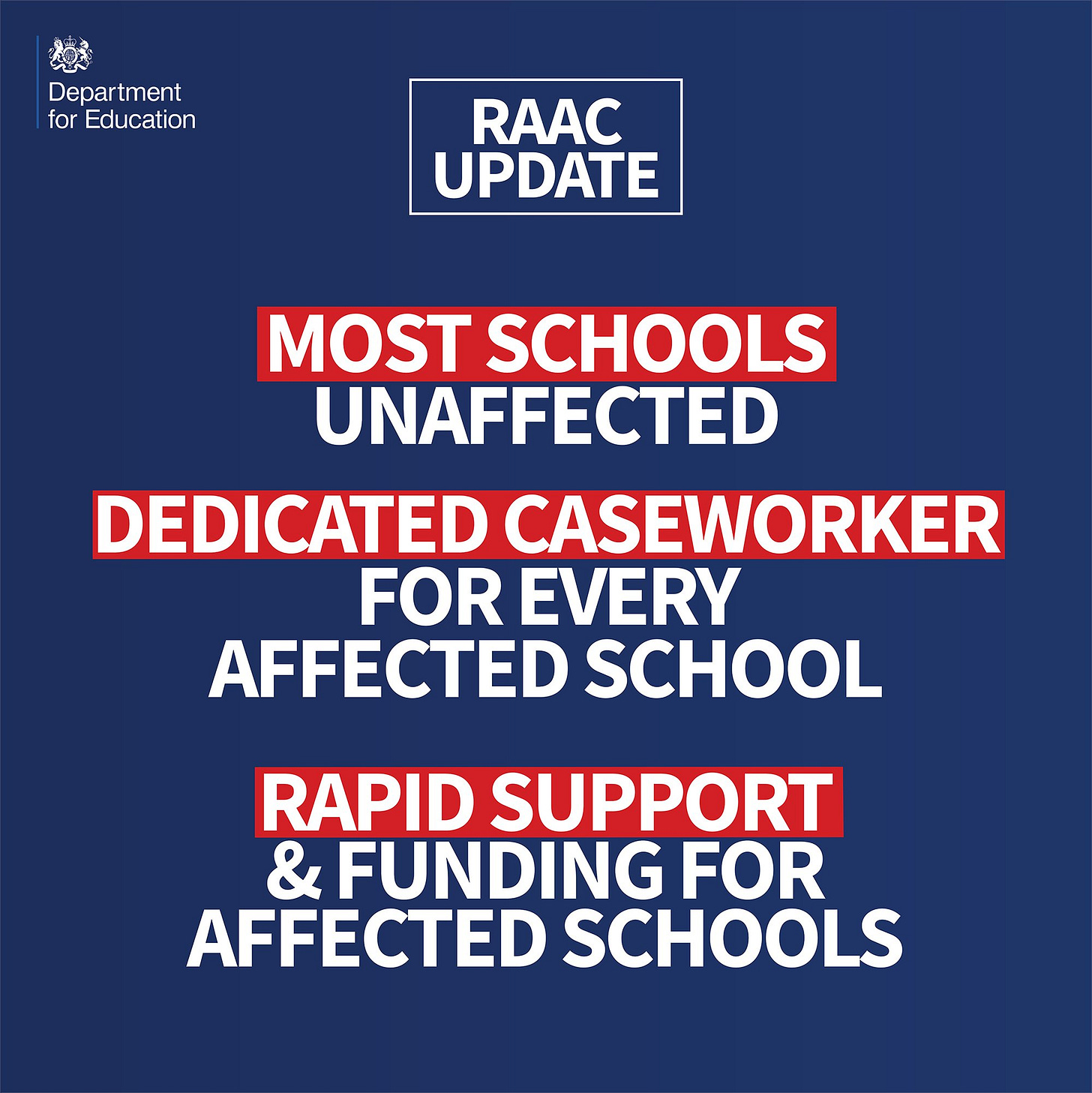Welcome to the 73rd edition of The Week in Polls, which takes a look at how the polls have moved for the Conservatives and for Rishi Sunak since state of concrete buildings hit the headlines.
Then it’s a look at the latest voting intention polls followed by, for paid-for subscribers, 10 insights from the last week’s polling and analysis. (If you’re a free subscriber, sign up for a free trial here to see what you’re missing.)
Meanwhile, this week’s postcard of gentle disappointment is heading over to the New Statesman for their use of a polling finding called “silly” by pollster Anthony Wells.
As ever, if you have any feedback or questions prompted by what follows, or spotted some other recent polling you’d like to see covered, just hit reply. I personally read every response.
Been forwarded this email by someone else? Sign up to get your own copy here.
Want to know more about political polling? Get my book here.
Or for more news about the Lib Dems specifically, get the free monthly Liberal Democrat Newswire.

Comparing the polls before and after the concrete crisis broke
It was the Westminster government’s announcement on 31 August that 156 schools had been identified as having a type of concrete prone to collapse that catapulted RAAC (reinforced autoclaved aerated concrete) from an obscure acronym in occasional news stories1 into a major political story.
There’s a fascinating long read yet to be written about why RAAC has become news now, given that, for example, The Standing Committee on Structural Safety back in 2019 warned of the risks, highlighting collapses in schools that happened, thankfully when the schools were empty, in 2016 and 2018.
But this is a polling newsletter, so let’s instead ask what impact has the story had on the polls so far?
Eight pollsters have released at least one poll with fieldwork wholly after 31 August. So for each pollster we can compare their polls after 31 August with those from before 31 August, averaging the polls where there was more than one in either period.2
Conservative Party voting intention
Deltapoll: 28% before / 28% after
More in Common: 29% before / 29% after
Opinium: 26% before / 26% after
Redfield & Wilton: 28% before / 27% after
Savanta: 29% before / 29% after
Techne: 25%3 before / 26% after
WeThink: 26% before / 27% after
YouGov: 25%4 before / 24% after
Average change in Conservative rating: 0%
Rishi Sunak net leadership rating5
Deltapoll: -24% before / -26% after
Opinium: -25% before / -30% after
Redfield & Wilton: -15% before / -17% after
WeThink: -16% before / -21% before after
YouGov:6 -33% before / -39% after
Average change in Rishi Sunak rating: -4%
The consistency of the pattern across pollsters, and the number of different pollsters involved, means we can start to have some confidence in the results even though the changes are small.
So far, the concrete crisis hasn’t put people further off voting Conservative. That may be because the Conservatives were already on very low ratings. Using my trusty Michael Foot yardstick (Labour’s 28% in 1983 under Foot was not only a landslide defeat, it was so bad it nearly destroyed the party), we can see that the Conservatives were already flirting with that depth of unpopularity. So perhaps they do not have that much further they can fall anyway, at least in the short term.
The Conservative Party’s hope has been that Rishi Sunak’s run of polling better than his own party will drag the party up.7 These figures, however, suggest the hope is continuing to slip away. Sunak’s own rating had already been falling, and in this most recent period his ratings have slipped further. Not as dramatically as some headlines on individual polls might make you think. But consistently down.
There have been other stories in the news and other factors in people’s lives, so we can’t put the slippage simply down to the concrete story. What we can conclude, though, is that it’s likely it has contributed to a further slippage of his ratings even though it hasn’t hit the Conservatives on voting intention.
Perhaps most importantly and more certainly, the clock also keeps on ticking down to the end of this Parliament. Any week in which the Conservatives don’t recover is one less week left for them to do so.
Know other people interested in political polling?
Refer friends to sign-up to The Week in Polls too and you can get up to 6 months of free subscription to the paid-for version of this newsletter.
National voting intention polls
Once again, it a week without a poll putting the Conservatives on more than 30%, extending the run stretching back to late June (when a Savanta poll gave them 31%).
Here are the latest figures from each currently active pollster:
For more details and updates through the week, see my daily updated table here and for all the historic figures, including Parliamentary by-election polls, see PollBase.
Last week’s edition
My privacy policy and related legal information is available here. Links to purchase books online are usually affiliate links which pay a commission for each sale. Please note that if you are subscribed to other email lists of mine, unsubscribing from this list will not automatically remove you from the other lists. If you wish to be removed from all lists, simply hit reply and let me know.
73% think government spending too much time on ‘woke’ issues, and other polling news
The following 10 findings from the most recent polls and analysis are for paying subscribers only, but you can sign up for a free trial to read them straight away.
Keep reading with a 7-day free trial
Subscribe to The Week in Polls to keep reading this post and get 7 days of free access to the full post archives.



